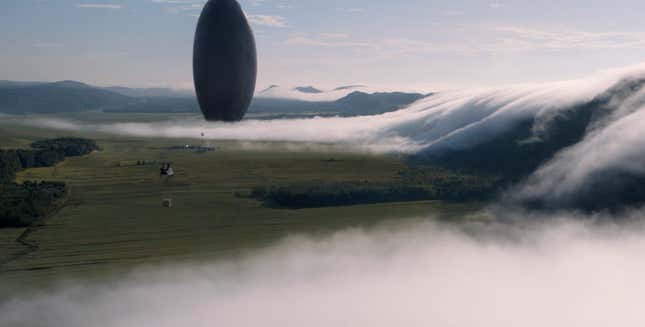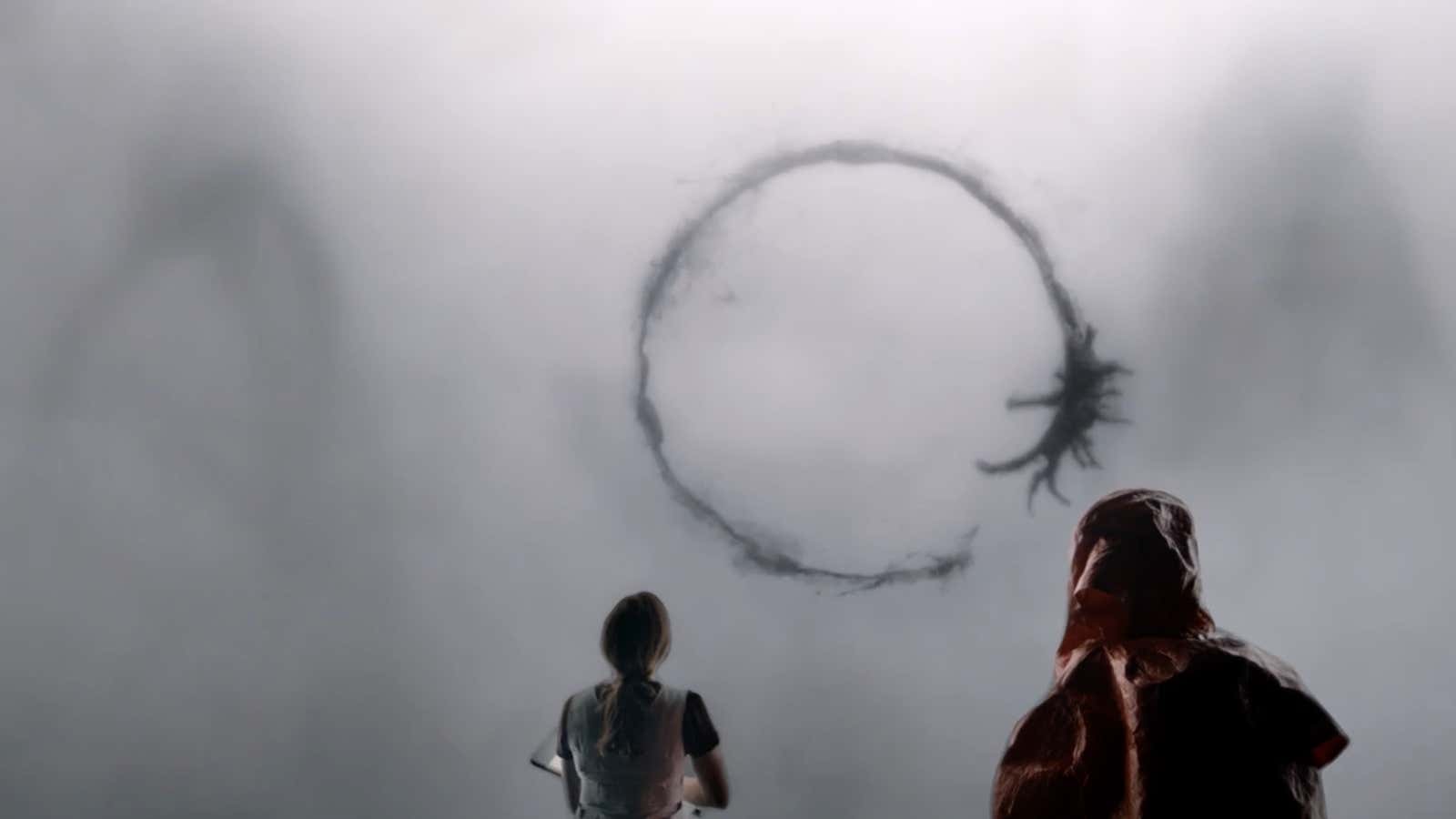Imagine that one day, 12 alien ships appear on Earth. One lands in China. One lands in Russia. Australia. Venezuela. And one lands in the United States, plopped down in the middle of a gorgeous green valley in Montana. These ships resemble hulking, charcoal egg shells, suspended in the air about 30 feet off the ground like a magic trick.
Now imagine having no idea what the things inside of these vessels want with us. And having no way to communicate.
This is the predicament that Dr. Louise Banks, a lonely linguist, faces in Arrival, the latest film by director Denis Villeneuve (Prisoners, Sicario). Banks is whisked away to a US military base set up outside the Montana shell. Her task: somehow, talk to the aliens. Figure out their purpose.
She’s not alone, however. Every country has its own Banks.
When she enters the bustling command center, she sees dozens of video monitors, each displaying a representative from a different country. It’s essentially an ongoing, global Skype session, as the nations of the world update one another on what they’ve learned about their mysterious visitors. Together, maybe, the world can find out what the creatures want.
But this harmony is short-lived. A certain powerful country selfishly insulates itself, cutting off all lines of communication with the global community. Other countries soon follow. The video feeds go dark; the flow of information stops entirely. Banks is, again, alone.
Arrival is a cerebral, hypnotizing sci-fi mystery, maybe the genre’s best in recent memory. Arranged searchingly by Villeneuve, with breathtaking cinematography by Bradford Young and a gracefully understated performance by Amy Adams as Banks, Arrival is, without hyperbolizing, a magnificent film.
Its power, though, arises not only from the filmmaking itself but also from the message it sends. In more ways than one, Arrival is a truly global film, embracing all that is good—and all that can be good—about a connected world.
The film serves as a firm rebuke to the insular worldview of US president-elect Donald Trump, who has boasted of plans to literally and symbolically restrict the movement of people and ideas across nations.

First, Arrival is itself a global production, the result of creative people of disparate cultures working together. Villeneuve is a French Canadian who only began making films in English in 2013. Jóhann Jóhannsson, the film’s composer and a frequent collaborator of Villeneuve’s, is Icelandic. The film’s editor, Joe Walker, is British. Arrival even makes great use of the gorgeous track “On the Nature of Daylight” by Max Richter, a German-born British composer whose work spans continents and can most recently be heard in HBO’s The Leftovers and Netflix’s Black Mirror.
Arrival was filmed mostly in Bas-Saint-Laurent, Quebec. With its emerald hills and ancient mountain ranges, the region in eastern Canada stood in for Montana, 2,000 miles away.
Villeneuve’s perceptive film asks many questions—about language, memory, family—but perhaps none are more pressing than the one most central to its plot: How should the world react to an existential threat? Should we put national interests first, or global ones? And aren’t the two, ultimately, the same?
Arrival isn’t preachy or political, but it’s impossible not to view the film through a globalist lens right now—given the results of the US presidential election, the Brexit vote, and the possibility that other countries could soon follow suit and isolate themselves from the rest of the world. Arrival suggests that doing so is self-destructive.
Last night, the film’s Twitter account posted this:
As one character says to another, “Language is the first weapon drawn in a conflict.” He’s talking about the aliens, obviously. If Banks says the wrong thing, or interprets an alien word or phrase the wrong way, that could be it for our planet. We know that because of thousands of years of human history, in which language—spoken, written, or otherwise—has played a key role in determining whether civilizations fight or become friends.
Words matter, Arrival shows us. Words must be used carefully, thoughtfully, reliably. And they must be used in the first place. When the nations in Arrival stop using their words to share ideas, they start using their weapons.
It takes an alien invasion to remind humanity that words are weapons—the most powerful ones of all, in fact.
